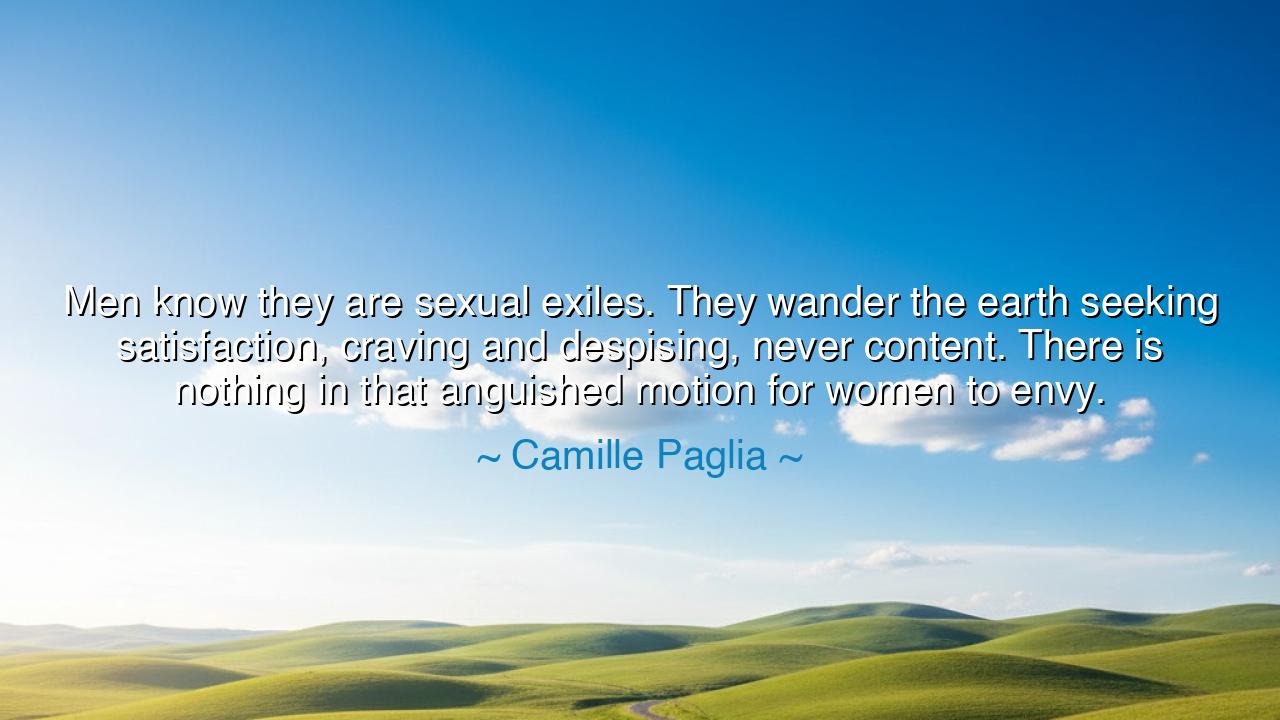
Men know they are sexual exiles. They wander the earth seeking
Men know they are sexual exiles. They wander the earth seeking satisfaction, craving and despising, never content. There is nothing in that anguished motion for women to envy.






The words of Camille Paglia thunder with primal force: “Men know they are sexual exiles. They wander the earth seeking satisfaction, craving and despising, never content. There is nothing in that anguished motion for women to envy.” In this vision, man is portrayed as a restless wanderer, forever unsatisfied, bound by desire that burns yet never brings peace. His strength becomes his torment, his conquest his chain. Paglia declares that in this endless cycle of hunger, there is no glory for women to covet, only a sorrowful exile to be pitied.
From the beginning of myth, this truth has been sung. Think of Odysseus, who, though a hero of Troy, spent ten years wandering the seas, drawn to Circe, Calypso, and countless temptations, yet never at rest until he returned home. His exile was not only from Ithaca but from contentment itself. In Odysseus we see Paglia’s vision of the male wanderer—desiring, conquering, but always yearning, always restless. The gods themselves seemed to decree that man’s appetite could never be fully sated.
History, too, reveals the same pattern. Henry VIII of England, though king and master of power, moved through wives and mistresses in restless pursuit, seeking satisfaction in love, lineage, and legacy. Yet his desire left him neither peace nor joy, only turmoil, blood, and broken bonds. His craving and despising consumed not only himself but an entire realm, proving Paglia’s point that the exile of male desire is destructive both to the man and to those around him.
By contrast, Paglia suggests that women stand closer to the ground of stability. Their power lies not in restless conquest, but in rootedness, in the ability to create and sustain. The anguish of wandering belongs chiefly to men, driven outward by an exile of spirit, while women, though they too suffer, may find within themselves a center of stillness. The envy often imagined—of male freedom, of male dominance—she overturns, revealing it instead as torment disguised as privilege.
So let this wisdom be carried forward: do not mistake restless wandering for freedom, nor endless craving for power. The sexual exile of men is a heavy burden, chaining them to their appetites and estranging them from peace. To women Paglia offers a gift: the reminder that they need not envy this anguish, for their strength lies elsewhere, in stability, creation, and the refusal to be consumed by the endless hunger that devours men. True greatness is not in wandering exile, but in the quiet mastery of the self.






TTNguyen Thi Thu Thanh
Paglia’s words seem to speak to the struggles that men face in navigating their own sexual desires, always seeking satisfaction yet never quite reaching it. But I feel like this paints too simplistic a picture of male sexuality. Is it possible that men are more conflicted or complex than the quote suggests? What does this perspective tell us about societal expectations and the ways in which both men and women approach intimacy?
BNBUI NGUYEN BICH NGOC
The idea that men are 'sexual exiles' paints an image of dissatisfaction and longing, which seems to imply that women should have no reason to envy this. But I question whether this is a fair characterization of male sexuality. Are men really always in pursuit of something unattainable, or is there more to their experience that Paglia overlooks? It raises questions about gender and the expectations placed on both men and women in terms of sexual fulfillment.
LNKhanh Ly Nguyen
Paglia’s quote suggests a stark and almost tragic view of men’s sexual experience, one marked by constant dissatisfaction. I wonder, though, if this perspective overlooks the more complex dynamics of relationships. Is it truly fair to say that men are always seeking and never content, or are there examples where this restless search doesn’t define their experience? Can this quote be seen as a reflection of societal pressures rather than an inherent male condition?
TNNguyen Thuy Nhi
Camille Paglia’s quote seems to capture a sense of male restlessness and frustration with their search for satisfaction. It paints a bleak picture of men as perpetual wanderers, always in pursuit but never finding peace. But is this an exaggeration, or does it reflect a real, underlying issue in how men are conditioned to view relationships and sexual fulfillment? Can this sense of longing be more complicated than just craving and despising?